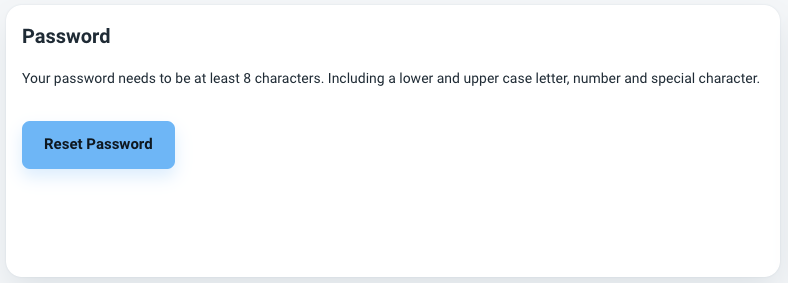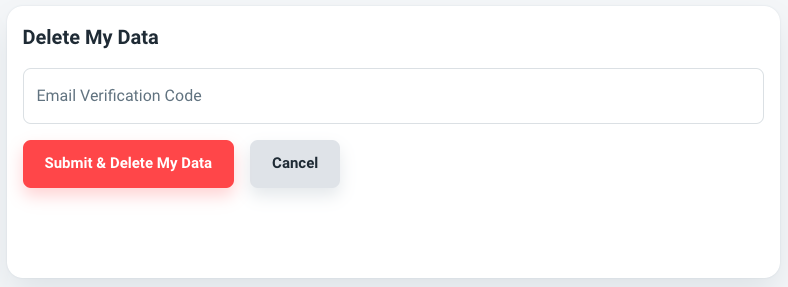MY ACCOUNT> SECURITY
Ability to Reset Password
One of the key strategies to ensure data security is by having the ability to reset passwords. Passwords are often the first line of defense against unauthorized access to our personal and sensitive information.
By offering users the option to reset their passwords, organizations can help users regain control of their accounts in case they forget their password or suspect that their account has been compromised. This affords an added layer of security by allowing users to choose stronger, unique passwords, minimizing the risk of unauthorized access.
NOTE: Passwords need to be at least 8 characters long with a lower and uppercase letter, number, and special character

Delete My Data
Protecting sensitive information doesn't just involve preventing unauthorized access but also giving users control over their own data. Many organizations collect personal data from users for various purposes. However, there may be instances where users want to apply their right to be forgotten and have their data deleted.
By offering a "Delete My Data" feature, organizations demonstrate their commitment to data privacy and security. This empowers users by allowing them to easily request the removal of their personal data from the organization's databases.
To delete your data, please choose the option "delete all data in my account." Once selected, you will receive a separate email containing a confirmation code. Please confirm and submit the code to complete the data deletion request.
NOTE: Once you delete your data it cannot be reversed.


Delegated Access Keys
In some scenarios, users may need to grant temporary access to their accounts to others, such as third-party service providers or family members. However, sharing login credentials can be risky, as it poses a threat to the security and privacy of the user's account.
Delegated access keys provide a secure way to delegate access without sharing login credentials. With delegated access keys, users can generate unique access tokens or keys that grant temporary access to their accounts. These keys can have specific permissions and time limitations, ensuring that the access is granted only to trusted individuals for a limited period.

Multi-Factor Authorization
In today's digital landscape, relying solely on passwords is no longer sufficient to protect sensitive information. Cybercriminals have become adept at cracking passwords, making it necessary to add an extra layer of security.
Multi-factor authentication (MFA) is an effective security strategy that requires users to provide multiple pieces of evidence to prove their identity. This typically involves something the user knows (password), something the user possesses (like a mobile device), or something inherent to the user (biometrics such as fingerprints or facial recognition).
By implementing multi-factor authentication, organizations can significantly reduce the risk of unauthorized access. Even if a hacker manages to obtain a user's password, they would still need the additional factor to gain access to the account. MFA adds an extra level of protection, making it much more difficult for attackers to compromise sensitive information.
